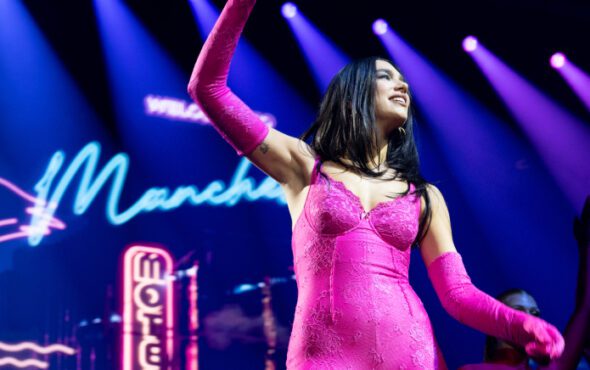
It’s been said a thousand times, but it bears repeating: Future Nostalgia was the ultimate lockdown record. Released in the midst of the pandemic, Dua Lipa’s sophomore album was met with overwhelming critical acclaim for reviving disco-pop in the mainstream, spawning chart-topping singles such as Don’t Start Now and Levitating in the process (the latter memorably made history as the longest-charting song by a female artist on the Billboard Hot 100). Dua defeated the so-called “sophomore slump” that has cursed artists in the past and supplied listeners – particularly queer listeners – with exactly what they needed while sequestered in their homes: a slick collection of intelligent, club-ready disco anthems that invoked a sense of excitement of post-lockdown nightlife.
This weekend, Dua finally opened the UK leg of her Future Nostalgia Tour in Manchester’s AO Arena after numerous delays as a result of COVID. The British singer’s excitement about returning to her home turf was clear, as she proclaimed to the crowd a couple songs in: “This is the best welcome home ever! We’ve been waiting so long to put this show on. We’ve moved it and postponed it and finally we’re here.”
The concert’s opener, Physical, saw the star display tremendous vocal range with exhaustive choreography that could rival some of the most experienced of entertainers. Dua’s energy and signature rasp never faltered throughout the whole two-hour set, we should add, even when she performed Levitating from a moving crane platform or when she catapulted her hair around the stage to the psychedelic house beats of Hallucinate.

The finest moments of the night came with FN’s baroque pop number Boys Will Be Boys, in which the crowd chanted along to Dua’s tongue-in-cheek lyrics about toxic masculinity and society’s perception of women, duetting with the floating head of Sir Elton John to their number one hit Cold Heart and the sensuous execution of shoulda-been-a-single Pretty Please.
Fever, a collaboration with Belgian singer Angèle, was another standout thanks to Dua’s euphoric vocals, while the star’s umbrella-assisted tribute to her New Rules video and now-iconic One Kiss jive elicited uproarious reactions from the crowd. Her vocals undeniably hit hardest with the arrival of Be The One, Dua’s lauded dream-pop hit from her self-titled debut that still stands as one of the best ballads in recent years.

With only a five-year catalogue of songs, the Future Nostalgia Tour – and this is a testament to Dua’s artistry – felt more like a greatest hits collection than a celebration of one studio album. It’s quite alarming, actually, to think that Dua initially had reservations about releasing the album. In an Instagram Live, she tearfully admitted to fans: “I’m not sure if I’m even doing the right thing, but I think the thing we need the most at the moment is music, and we need joy and we need to be trying to see the light.”
The latter part of the her statement couldn’t be truer. Future Nostalgia’s impact on the pop industry is unquestionable, and it’s impossible to escape – as if we would want to? – the aforementioned tracks in LGTBQ+ bars and clubs (four of them have already been lip-synced to on RuPaul’s Drag Race). Dua had already cemented her status as an LGBTQ+ icon and one of the most talented artists of her generation with this album, but this tour proved something else we’d long suspected: that Dua can effortlessly top the charts and command arenas.
GAY TIMES gives Future Nostalgia Tour – 5/5



